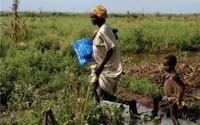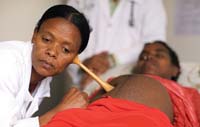13.2 Setting goals and objectives
Once you have identified the specific problems you intend to address, the next step is to prepare the goals and objectives for your health education activities (Box 13.2). Without goals and objectives your activities may lack direction, and it may be difficult to monitor and evaluate how effective your health education interventions have been.
A goal is a broad statement that can clearly describe what your health education activity is designed to achieve. It provides an overall direction for your activities. Your health goals might be something very general like: ‘My goal is to improve the health of women and children in my locality.’
An objective is more specific than a goal, and it should be achievable. It is the outcome that you want to accomplish through a health education intervention (Figures 13.3 and 13.4). If you do not have objectives, you cannot evaluate the effectiveness and efficiency of your health education activities. An objective has five elements. A good objective must include all of these five elements. Box 13.2 describes them.


Box 13.2 The five elements of an objective
Objective statements must be written in a way that will answer the following questions:
- Things to be achieved: What do you want to achieve?
- Place: Where?
- Target group: Who is the target group?
- Time: When do you want to achieve it?
- Extent of achievements: Can you measure the improvement in health that you have achieved?
Now read Case Study 13.1.
Case Study 13.1 Setting a goal and objective for addressing malaria in your kebele
If your needs assessment has shown that malaria is a problem in your locality, your goal might be very general. You might say something like, ‘My goal is to reduce the amount of malaria in my kebele.’
You may also discover that one of the reasons for the malaria is that the uptake of insecticide-treated bed nets (ITN) is quite low in your kebele, so your objective would be something more specific and detailed. You might decide that your objective should be: ‘To increase the number of households who use bed nets properly in my kebele from 100 to 200 within six months.’
You could look in more detail at this objective:
| ● What? | More people should use bed nets to prevent malaria |
| ● Where? | Throughout my kebele |
| ● Who? | Households, especially those with pregnant women |
| ● When? | Within the next six months |
| ● Extent of achievement | The number should increase by at least 100 households. |
It is important to note that the objective should have a deadline, and it should be achievable. Now try this out with the two examples below.
Bilise is a Health Extension Practitioner. She is working in a village called Sato. She always plans her health education activities clearly. One of the objectives in her plan is: ‘To increase the number of pregnant women who attend for antenatal care in Sato village from 15 now to 35 by the end of three months.’ Has she included all the elements of an objective in her statement? Identify each element that she has used. The bullet points in Case Study 13.1 will help you to organise your answer.
Yes, Bilise’s objective is correctly written. It addresses all the elements that should be included when writing an objective. Each element could have been expressed like this:
● What? Increased uptake of antenatal care ● Where? In Sato village ● Who? Pregnant women ● When? Within three months ● Extent of achievement Increase by another 20 pregnant women.
Suppose Ayisha is a Health Extension Practitioner working at her health post in a village called Deneba. She wants to plan her health education activities on the subject of female genital mutilation (FGM) for village mothers. She intends to educate 100 mothers within the next four months. Based on this information, how do you think Ayisha should write her objective?
Ayisha’s objective could be written as: ‘To provide health education on FGM for 100 mothers who live in Deneba within the next four months.’
13.1 Identifying and prioritising health problems
